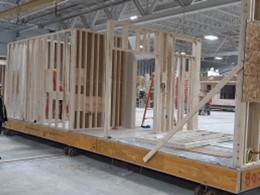Recently I toured a modular home factory on the East Coast that was as close to optimal as I’ve ever seen. When I mentioned this to my friends in offsite construction, they said I must have been in Willie Wonka’s factory as they had never seen anything like I described. Turns out it wasn’t a chocolate factory but rather a modular factory running as smoothly as it possibly could.
And no, I won’t mention the name as I want everybody to think it’s their factory!

.
In modular home manufacturing, achieving a state of perfect balance is more than an operational ambition—it’s essential for thriving and expanding in the industry. Such balance is realized when a factory demonstrates outstanding performance across all facets of its operations. From optimizing production processes to ensuring complete customer satisfaction, every aspect significantly contributes to the overarching vitality and efficiency of the manufacturing entity.
Optimal Production Efficiency
At the heart of a balanced manufacturing operation lies optimal production efficiency. This is characterized by high levels of productivity coupled with minimal waste, ensuring that resources such as materials, energy, and labor are used as efficiently as possible. Achieving high yield rates while minimizing waste not only enhances profitability but also contributes to sustainability efforts by reducing the environmental footprint of manufacturing processes.
Equipment Utilization
Effective equipment utilization is another hallmark of a well-balanced factory. It involves operating machines and equipment at their full potential with minimal downtime. This requires a proactive approach to maintenance, scheduling regular checks and repairs to prevent unexpected breakdowns. Such practices ensure the longevity and reliability of machinery, which in turn supports consistent production output and quality.
Quality Control
Quality control stands as a pillar of manufacturing excellence. In a balanced factory, products consistently meet established quality standards, reflecting the efficacy of the quality control systems in place. Key indicators of quality balance include low defect rates and high customer satisfaction, both of which contribute to a strong market reputation and customer trust.
Inventory Management
Effective inventory management is crucial in maintaining the equilibrium of manufacturing operations. A balanced factory maintains optimal inventory levels, adeptly balancing the need to meet production schedules without overstocking. Efficient inventory management prevents the unnecessary tying up of capital and space, thereby optimizing operational flow and reducing costs.
Supply Chain Coordination
Supply chain coordination ensures a seamless flow of materials and components from suppliers to the production line and onto the delivery of finished goods. This aspect of manufacturing requires establishing and maintaining good relationships with suppliers, reliable logistics, and effective control over inventory to prevent bottlenecks and delays, which are critical for maintaining production timelines and meeting customer demands.
Workforce Management
A balanced manufacturing environment also pays close attention to workforce management. This involves ensuring that all employees are well-trained and utilized efficiently, balancing labor costs with production output. High employee morale and low turnover rates are indicative of effective workforce management, contributing to a stable and productive operational environment.
Financial Stability
Financial health is fundamental to the sustainability of any manufacturing operation. A balanced factory operates profitably, efficiently managing costs and revenues. This financial stability supports sustained investment in technology, staff, and facility improvements, which are essential for ongoing development and competitiveness.
Safety and Compliance
Compliance with safety standards and regulations is non-negotiable in the manufacturing sector. A balanced factory not only adheres to these standards to protect its workforce and the environment but also ensures that all operations are compliant with legal and industry-specific guidelines. This commitment to safety and compliance mitigates risks and enhances the reputation of the enterprise.
Adaptability and Innovation
In today’s market, adaptability and innovation are critical for maintaining balance. A factory that is flexible in its operations and open to integrating new technologies or processes is better equipped to improve efficiency and expand its product offerings, thereby staying ahead of market trends and customer expectations.
Customer Satisfaction
Ultimately, the measure of a factory’s balance is reflected in how well it meets or exceeds customer expectations regarding product quality, delivery times, and service. High levels of customer satisfaction lead to repeat business and positive referrals, which are vital for long-term success.
My Final Thoughts
Achieving balance in these key areas allows a factory to operate smoothly, remain competitive, and effectively respond to changing conditions in the market or production needs. The art of manufacturing balance is not static but requires continuous evaluation and adjustment as technologies advance and market dynamics evolve. In essence, a balanced factory is not defined by the absence of challenges but by its ability to efficiently and effectively manage them.
.
CLICK HERE TO READ THE APRIL ISSUE
.
Gary Fleisher is a renowned blogger and commentator on construction and housing trends, known for his insightful analysis of the industry.























